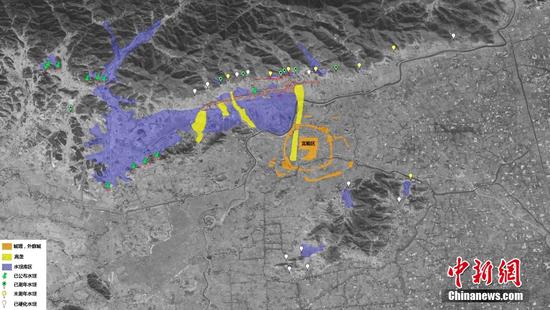
Wildlife on Dazhong Mountain, which forms part of the Ailao Mountains National Nature Reserve, is protected by officers at Hongtupo Forest Police Station in Chuxiong Yi autonomous prefecture, Yunnan province. (HOU WEIJING/FOR CHINA DAILY)
Illegal hunting of birds targeted, migratory species protected
In the past four decades, Dazhong Mountain in Yunnan province has stood silent witness to ways in which public awareness on environmental protection has changed significantly, with humans and wildlife benefiting from green efforts.
From September to February each year, the mountain, situated in Nanhua county, Chuxiong Yi autonomous prefecture, is home to more than 50 million migratory birds from some 430 species.
Local villagers, who have been lifted out of poverty, used to visit the mountain to catch birds to eat or sell. The residents nicknamed the mountain "Da Que Shan", which translates as "bird-hunting mountain". But one year, chirping birds were no longer heard on its slopes.
Tao Faqing, 61, who lives in Zhongshan village in Nanhua, said: "When I was young, every year the birds passed through Da Que Shan, and people in the village would hunt them. Gradually, these avian visitors fell silent."
Environmental damage in the area also posed a threat to other creatures and plants on the mountain, which covers 17,100 hectares, is rich in biodiversity and forms part of the Ailao Mountains National Nature Reserve.
"When the mountain became barren and the birds stopped chirping, people began to worry if migrant species would ever return to the area," Tao said.
"We used to hunt birds, just as people visiting the coast go digging for clams, and those in the mountains go mushroom-picking. At the time, no one realized that hunting birds was wrong. If we didn't hunt them, what would we serve our guests during Spring Festival?"

Wildlife on Dazhong Mountain, which forms part of the Ailao Mountains National Nature Reserve, is protected by officers at Hongtupo Forest Police Station in Chuxiong Yi autonomous prefecture, Yunnan province. HOU WEIJING/FOR CHINA DAILY
In 1984, the Hongtupo Forest Police Station was established to crack down on illegal hunting and protect migratory birds. Officers at the station worked on the mountain from September to February, tracking the paths of migratory birds.
Initially, police patrolled the mountain without any major life necessities. There were no communication signals, and officers slept in tents despite the cold and the threat from wild animals, until a small shelter was built at the foot of the mountain in 2010.
Police officer Liu Yan said: "The toughest time was winter, when my quilt was never dry. When I was on duty, I walked long distances and sometimes found myself separated from my colleagues. I was all alone in the vast mountains. Words can't describe how I felt on such occasions."
Yang Zhengqiang, another police officer, said the forest terrain is steep, and poachers sometimes hide in the area.
"At night, when we are looking for poachers, we don't make a sound or use our flashlights. We once saw a campfire in the distance, but while crossing a ravine, I slipped and fell. My colleagues didn't notice, and I was afraid the accident would affect the operation, so I didn't dare make any noise. When dawn broke, I realized a high cliff was just a little further ahead of me."
Li Qiangao, former head of the police station, said: "In addition to mosquitoes and leeches, we needed to look out for wild boars, bears and venomous snakes. We often rolled around on the ground while capturing poachers, and when we stood up, we were covered in blood, as there were also many thorny plants in the forest."
He added that the police sometimes fell into ditches or became lost when they chased the poachers. Li once walked for two hours along a stream until finding a way off the mountain when the sun rose.

Wildlife on Dazhong Mountain, which forms part of the Ailao Mountains National Nature Reserve, is protected by officers at Hongtupo Forest Police Station in Chuxiong Yi autonomous prefecture, Yunnan province. HOU WEIJING/FOR CHINA DAILY
The duration, personnel and routes of the patrols are generally not fixed. The walking distance ranges from 5 to 50 kilometers. During patrols, the officers carry essential equipment such as tents, sleeping bags, ropes, water, medicine and food — usually rice and dry rations. Each patrol group consists of two to 10 people, Li said.
In heavy fog, officers on patrol teams connect themselves with a rope to prevent falling or getting lost. In extreme weather conditions, when they lose their way or are attacked by animals, they leave their remaining supplies of food and water with younger officers to seek help.
"It is a tradition to leave the last drop of water for such officers so that our mission of protecting migrant birds is passed down from generation to generation," Li said.
Since 2009, a total of 1,516 administrative forestry cases have been investigated and handled, with 1,589 individuals penalized. More than 376 illegal hunting tools have been confiscated, along with 264 firearms and more than 2,300 rounds of ammunition.
Door-to-door visits
As well as targeting criminal offenses, officers at the police station, together with the local government, work to improve awareness among villagers of the need to protect birds and other forms of wildlife.
Police carry out door-to-door visits among villagers to promote such work, but at first, the villagers didn't listen. Li said, "Before we entered their homes, I heard them muttering: 'Here come those people again'."
He added that officers first chat with the villagers, and help them with farm work. After this, the main focus is on promoting laws and regulations related to wildlife protection, along with the legal responsibilities associated with hunting and eating wild animals.

Officers fetch water from a stream during a patrol on Dazhong Mountain. HOU WEIJING/FOR CHINA DAILY
To change the villagers' views, police also organized promotional activities in schools to get their message across to children.
Li said, "From resistance to acceptance, and then to support, each stage has taken a long time, ranging from several years to more than a decade, or even several decades."
Forty years ago, when he was a child, Li lived in a village in the area. One day, he saw adults lighting a bonfire and walking into the mountains with bamboo poles. Migratory birds flew toward the fire, falling victim one by one to the poles. The villagers collected the birds and took them home to eat.
"The cries of the birds echoed around the mountains, and also triggered my desire to protect them," Li said. After asking his father how he could help save migratory birds, his father told Li he could do so by becoming a police officer.
In 1999, Li graduated from a police training school, and for 18 years worked as chief of Hongtupo Forest Police Station, performing his duty of protecting the birds.
"Years ago, people thought birds were there to be hunted and eaten. Now, even children know that birds are to be observed and loved. The 'bird-hunting mountain' has become the 'bird-protecting' mountain," Li said.
Years of hard work have paid off. Since 2019, there have been no reports of wild birds being hunted on Dazhong Mountain. The police station now operates mainly to promote avian protection and wild animal rescue work.
Modern technological aids such as video surveillance, infrared cameras and drones are used to monitor poachers, fires and the behavior of wild animals.
If migratory birds encounter strong sources of light from cities or villages along their flight paths, they are easily misled and deviate from their intended route.


















































 京公网安备 11010202009201号
京公网安备 11010202009201号